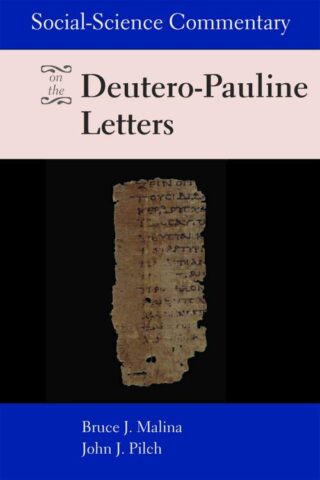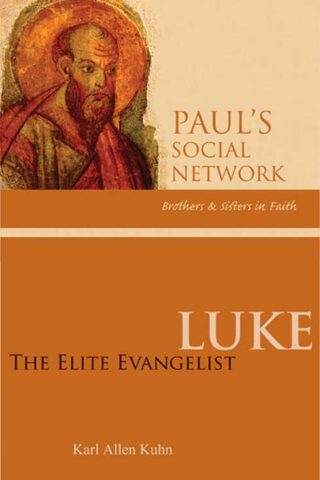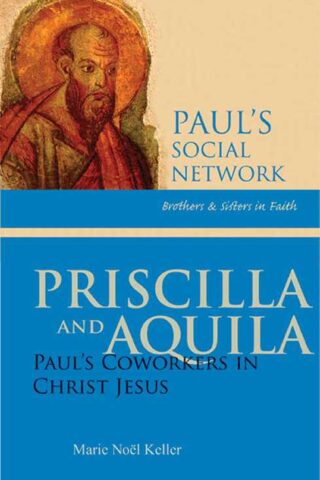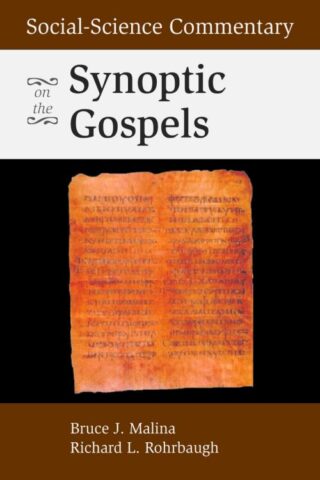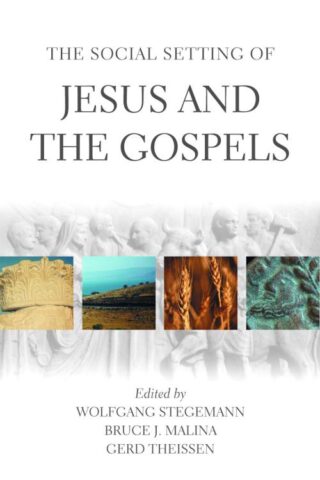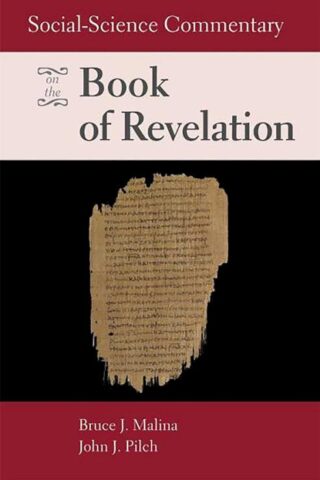Bruce Malina
Showing all 7 resultsSorted by latest
-
Social Science Commentary On The Deutero Pauline Letters
$56.25The Social-Science Commentary series pioneers an alternative commentary genre, providing in this volume the text of the deutero-Pauline letters and cultural notes on them. The Social-Science Commentary on the Deutero-Pauline Letters provides essential “reading scenarios” on specific cultural phenomena in these letters, including forgery, normative conflict, paideia (training), and Household Codes. This volume highlights the transformation of the memory of Paul in early Christianity as reflecting the concerns and interest of communities after Paul’s death.
Add to cartin stock within 3-5 days of online purchase
-
Luke : The Elite Evangelist
$13.95Human beings are embedded in a set of social relations. A social network is one way of conceiving that set of relations in terms of a number of persons connected to one another by varying degrees of relatedness. In the early Jesus group documents featuring Paul and coworkers, it takes little effort to envision the apostle’s collection of friends and friends of friends that is the Pauline network. The persons who constituted that network are the focus of this set of books. For Christians of the Western tradition, these persons are significant ancestors in faith. While each of them is worth knowing by themselves, it is largely because of their standing within that web of social relations woven about and around Paul that they are of lasting interest. Through this series we hope to come to know those persons in ways befitting their first-century Mediterranean culture.
What can we discover about the author of the third gospel and Acts, the companion of Paul whom tradition names Luke? How might that enable us to better appreciate the writings he produced that comprise roughly a quarter of the New Testament? Using literacy in the Greco-Roman world and Luke’s advanced literary acumen as his primary clues, Karl Allen Kuhn argues that the evangelist was a member of the social elite. Social scientific models tell us that as an elite, Luke would have benefited from a highly stratified social and economic hierarchy that ensured the flow of wealth and resources to a few at the expense of the many. And yet, Kuhn argues, scene after scene of Luke’s narrative challenge the stratified world shaped by Rome, calling its readers to embrace a new Kingdom and a new Lord. Writing to the “most excellent Theophilus,” Luke calls upon his fellow elites to join him in leaving behind the world that has given them so much and to devote themselves not to the Emperor but to the true Savior of humankind.
Add to cartin stock within 3-5 days of online purchase
-
Priscilla And Aquila
$19.95Human beings are embedded in a set of social relations. A social network is one way of conceiving that set of relations in terms of a number of persons connected to one another by varying degrees of relatedness. In the early Jesus group documents featuring Paul and coworkers, it takes little effort to envision the apostle’s collection of friends and friends of friends that is the Pauline network. The persons who constituted that network are the focus of this set of books. For Christians of the Western tradition, these persons are significant ancestors in faith. While each of them is worth knowing by themselves, it is largely because of their standing within that web of social relations woven about and around Paul that they are of lasting interest. Through this series we hope to come to know those persons in ways befitting their first-century Mediterranean culture.
In her exploration of the texts about Priscilla and Aquila, Marie Nol Keller asks, “What does God want us to learn from their story?” The biblical writings show that they worked, lived, and traveled with Paul. As his trusted coworkers, Priscilla and Aquila provided a presence that strengthened the early Jesus groups. Their mutuality in ministry and their leadership as laypeople can inspire members of church communities today to work together as teachers and preachers of the gospel.
Add to cartin stock within 3-5 days of online purchase
-
Social Science Commentary On The Synoptic Gospels (Reprinted)
$65.00Contemporary biblical interpretation has narrowed the gap between modern reader and ancient author—but chiefly regarding individual events and ideas. This commentary mines cultural anthropology, macro-sociology, and social psychology to elucidate the values, conflicts, and mores of ancient Mediterranean culture. Through detailed textual notes and “reading scenarios,” it brings life and light to the synoptic texts.
Add to cartin stock within 3-5 days of online purchase
-
Social Setting Of Jesus And The Gospels
$65.00What do the social sciences have to contribute to the study of Jesus and the Gospels? This is the fundamental question that these essays all address-from analyses of ancient economics to altered states of consciouseness, politics, ritual, kinship, and labeling
Add to cartin stock within 3-5 days of online purchase
-
Social Science Commentary On The Book Of Revelation
$53.33The author of Revelation presents himself as John, the astral seer, who professes faith in the Resurrected Jesus and who belonged to the house of Israel. John writes of traveling in to the sky; but this perspective of “sky-visions” is completely neglected in the traditional commentaries and studies on Revelation. Malina and Pilch demonstrate the necessity of taking ancient sky-interpretation seriously for reading the book of Revelation in its first-century context.
Add to cartin stock within 3-5 days of online purchase
-
Portraits Of Paul
$48.00These pioneers in applying cultural anthropology to the New Testament re-examine Acts and the Epistles, drawing contrasts between modern and ancient views of personality. They show how public speeches were shaped by conventions of rhetoric and morality, while honor/shame and gender distinctions cause us to misread Paul.
Add to cartin stock within 3-5 days of online purchase






